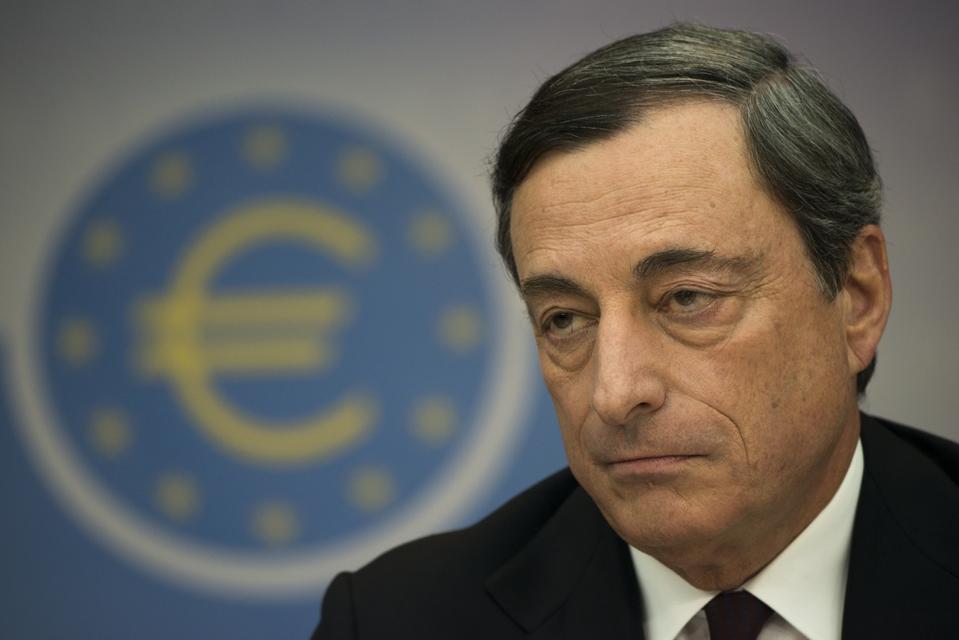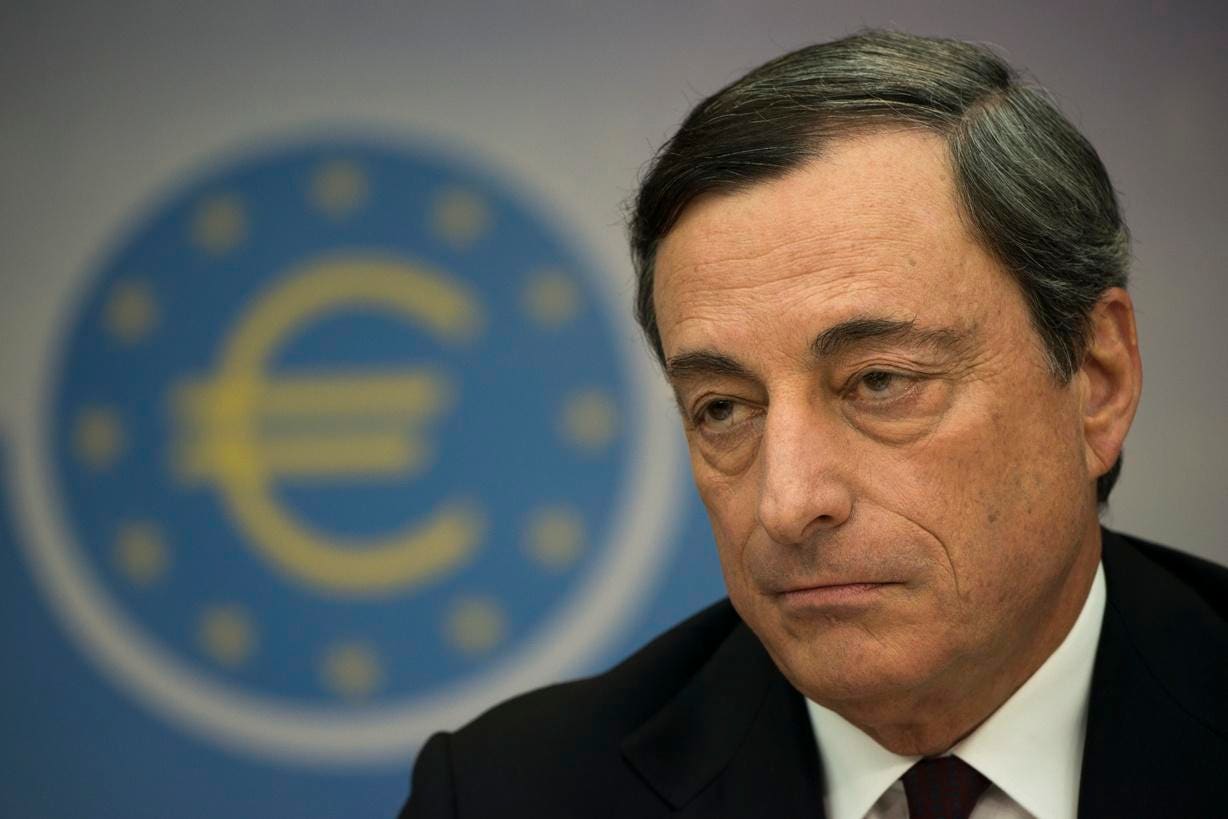
Mario Draghi: Questioning European regulations (Photo by Horacio Villalobos/Corbis via Getty Images)
Corbis via Getty Images
“The EU’s regulatory stance towards tech companies hinders innovation” is not an observation from some rabid anti-European Union American free marketer. It comes from Mario Draghi, former Prime Minister of Italy, economist and ex-head of the European Central Bank. He made the comment just last year in a report he entitled “The Future of European Competitiveness.” It’s been mostly overlooked here in the US, but it carries many useful insights for this side of the Atlantic. In it Draghi identifies the present situation as “an existential challenge. Europe’s fundamental values are prosperity, equity, freedom, peace and democracy in a sustainable environment. The EU exists to ensure that Europeans can always benefit from these fundamental rights. If Europe can no longer provide them to its people – or has to trade off one against the other – it will have lost its reason for being.
“The only way to meet this challenge is to grow and become more productive, preserving our values of equity and social inclusion. And the only way to become more productive is for Europe to radically change.”
Someone of that political bent, and stature, challenging the EU’s overreliance on regulation in place of encouraging freer marketplace dynamics provides an interesting contrast to the regulations and regulators of Brussels, and with that their adverse effects on job creation, on economic growth and on the development of products that help consumers live more practical and even enjoyable lives in the age of digital.
Draghi’s report also says, “Technological change is accelerating rapidly. Europe largely missed out on the digital revolution led by the internet and the productivity gains it brought: in fact, the productivity gap between the EU and the US is largely explained by the tech sector. The EU is weak in the emerging technologies that will drive future growth.”
The kind of political pressure that led the EU to focus more on regulation than on innovation is likely to be even more problematic in the age of artificial intelligence (AI), which will certainly create new winners and losers in the world economy.
That should make the missed opportunities of the recent past even more salient lessons. It would seem that the loss of innovation is too frequently balanced out via fines with the EU focused more on collecting fees from other countries’ companies than on driving local innovations. In that environment, one could wonder if the EU establishment, and specifically its regulators, is more interested in making moralistic statements, fine-tooth combing reams of arguments, than in drilling down on making the hard economic choices that stimulate jobs and growth, such as that, by Draghi’s own admission, has powered much dynamism in the US from the dawn of the digital age.
Since 2022 the EU Commission has levied regulatory fines that have totaled $2.4 billion for Meta, $2.5 billion for Apple, and $7.2 billion for Google. Add that up ($12.18 billion) and one could well be allowed to suspect cynically that it’s a way to underwrite the regulators and their staffs and their office space, a way of shifting profits from the American innovators, and their investors, and spreading them as government grants back to the EU economy, replacing what could have been local taxes paid by workers in the private economy. (It’s not just US companies feeling the heavy hand of European regulators. China has also paid fines, for TikTok, including $600 million in May 2025, but beyond that, fines on other companies, including those levied on EU companies, are much, much lower overall.)
Christine Lagarde: President of the European Central Bank, and “mind-boggled” by the gap between US and European economic growth rates (Photo by Francois G. Durand/Getty Images)
Getty Images
Draghi isn’t of course the only European who is concerned about the balance between regulation and innovation. Also just late last year, Christine Lagarde, one of the world’s most respected economists, told Le Monde that while the U.S. is rapidly advancing in AI and tech, Europe’s pioneering is focused on being a regulator rather than a creator of AI technology. “This is making players in this sector tell themselves: ‘Let’s do this somewhere else, it’ll be simpler and we’ll have fewer barriers and constraints.’” Lagarde also told the US Council on Foreign Relations, “It’s just mind-boggling that productivity [growth] in the United States between 2019 and now has been 6%. In Europe, 0.6%.”
Especially in the age of AI, regulation in Europe “is making players in this sector tell themselves: ‘Let’s do this somewhere else, it’ll be simpler and we’ll have fewer barriers and constraints.’”
Christine Lagarde, President of the European Central Bank
Again, this is not some Euro leftist talking. Lagarde has herself been president of the European Central Bank since 2019, succeeding Draghi. She previously served as the 11th Managing Director of the International Monetary Fund (IMF) from 2011 to 2019. Lagarde had also held high positions in the government of France, most prominently as Minister of the Economy, Finance and Industry from 2007 until 2011.
To summarize what both Draghi and Lagarde have observed: Overregulation and the tendency to prefer it to encouraging the private sector to innovate pushes innovators outside Europe.
Most recently, earlier this month, the EU fined Google about $3.46 billion, claiming the way it runs its ad-tech business gives it an “unfair” advantage over others.
Strangely enough, that’s a good lesson now for the US to learn from. Even well-meaning regulation can have soul-destroying and industry-crushing consequences. Unfortunately, technology and AI are barreling toward the same fate, and not just for the EU.
VC investment in AI is skyrocketing – funding in the first half of 2025 was more than the whole of last year according to EY. But 97% of the deal value of those investments went to the US, while only 2% went to Europe and the Middle East. That’s not even at the level of a tip percentage.
Meanwhile, the penalties for companies that do try to operate in the EU under onerous and complex regulations have been hefty.
Europe is a cautionary tale, not one the US should emulate or ignore.
Making things even stranger is that the current DOJ and policymakers seem interested in more regulation, not less. The last few months have seen record fines and fine threats—and antitrust legal cases involving major tech companies.
Meta paid $1.4 billion in fines in 2024, and Google had a $1.4 billion settlement with the Texas Attorney General over privacy in May 2025 —and that’s just two of the companies embroiled in regulatory action. The remedies proposed by the judge in the recent federal “search case” were viewed in many circles as less severe than many in the ad industry had thought would apply, but of course there are still cases out there like the Meta breakup trial, the US Google ad-tech case, the Apple smartphone monopoly lawsuit and the ongoing investigations of Microsoft, OpenAI and Nvidia.
President Donald Trump has made a point of challenging Europe’s attempt to export stifling regulations like the Digital Markets Act (DMA) against US technology companies, recognizing that American competitiveness “is driven by cutting-edge American tech companies, and the American innovation and workers behind them.” Heavy-handed regulations like DMA threaten to hamstring innovation—if the regulators will degrade innovations or give them to competitors, why innovate?
But besides that, and despite that, the current DOJ seems intent on beating Europe at its own game: Stifling pro-consumer innovation, productivity and dynamism with unprecedented regulatory requirements that might benefit just a handful of vocal commercial rivals. And it’s a not so thinly veiled tax on innovation that could make the unintended consequences of GDPR look like a good time by comparison.
Regulatory punishments, rather than innovation inducements, are a massive drag on modern economies. It’s a story we’ve seen unfold (badly) in Europe for years; Why would we want to import that here just as AI gives us a whole new path to growth?
